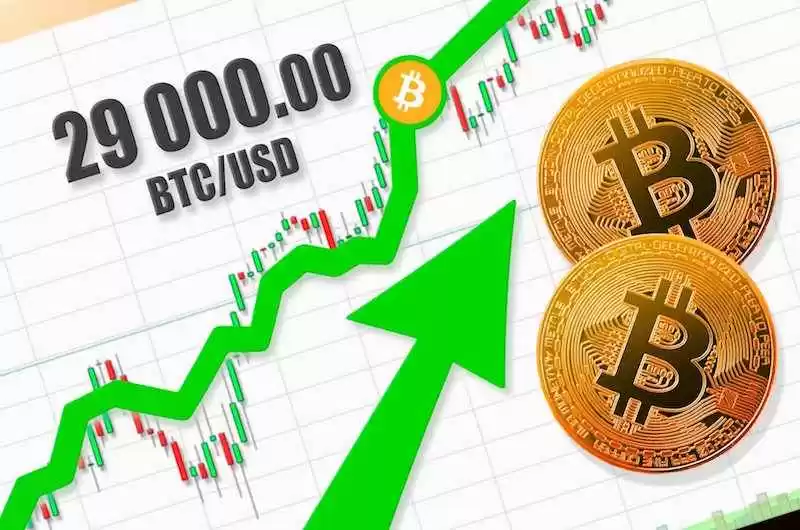Bitcoin has now surged to $29,000 USD, marking a substantial breakthrough above the weekly SMA200 and EMA200 moving averages, underlining its considerable significance.
Matrixport suggests that the approval of BlackRock’s spot Bitcoin exchange-traded fund (ETF) could trigger a significant $BTC price surge to $56,000. Their analysis indicates that if the total market capitalization of leading stablecoin Tether increases by $24 billion, serving as a proxy for potential ETF inflows, the flagship cryptocurrency’s price could rise from its current $28,800 to $42,000.
Furthermore, should there be an influx of $50 billion, representing a 1% allocation from registered investment advisors, the price of Bitcoin could potentially reach $56,000. This $50 billion estimate is derived from an earlier report that evaluated the 15,000-strong U.S. registered investment advisor (RIA) community overseeing approximately $5 trillion.
To put this into perspective, if we compare the market capitalization of precious metals ETFs, which stands at around $120 billion, and assume that 10% to 20% of investors exposed to these funds consider Bitcoin as a way to diversify their assets amidst monetary debasement and inflation concerns, we could see $12 to $24 billion flowing into a Bitcoin ETF.
It’s worth noting that the cryptocurrency market experienced a surge in activity due to false rumors suggesting the U.S. Securities and Exchange Commission (SEC) had granted approval for BlackRock’s spot Bitcoin ETF. As a result, analyst Alessandro Ottaviani speculated that $BTC could potentially reach $1 million, leading to a market capitalization exceeding $21 trillion.
Ottaviani pointed out that Bitcoin’s market capitalization increased by over $50 billion in just minutes during the rumors, with an estimated $500 million of capital entering the market. This implies a remarkable ratio of 100:1, signifying that for every dollar invested, Bitcoin’s market capitalization surged by $100.
Drawing from a former BlackRock Director’s insights, Ottaviani projected that between $150 billion to $200 billion could flow into the Bitcoin market within three years following the approval of a spot Bitcoin ETF in the United States. Using the same ratio, a $200 billion influx would theoretically result in a Bitcoin market cap of $21 trillion, propelling the price of a single Bitcoin to $1 million.
A spot Bitcoin ETF would offer a regulated and mainstream investment avenue for individuals seeking exposure to Bitcoin without the need to own the cryptocurrency directly.
Cathie Wood Predicts a Sharp Increase in Bitcoin Price
Cathie Wood, the CEO of ARK Invest, renowned for her bold Bitcoin predictions, has once again raised the stakes with a new, audacious projection for the pioneer cryptocurrency. In a recent conversation with Natalie Brunell, host of the “Coin Stories” podcast, Wood unveiled her latest price expectation for Bitcoin.
>>> Tesla Holds Steady on Bitcoin and AI Amid Earnings Disappointment
Wood’s insights stem from ARK Invest’s research team, which anticipates that Bitcoin’s growth will be chiefly steered by institutional adoption. They foresee a substantial surge in the digital asset’s value as the next decade unfolds.
Wood highlights the typical pattern of institutional investors when adopting new assets and how they incrementally allocate them in their portfolios. Currently, Bitcoin is in the initial phase, with institutional investors cautiously allocating around 1% of their holdings to this digital asset to gauge its performance.
Gradually, this allocation is expected to expand until it reaches the 5% to 6% range. As Wood has emphasized before, this pivotal moment is when BTC is poised to break the seven-figure threshold.
Wood’s vision is for Bitcoin to surpass $1 million by 2030, but she doesn’t stop there. She envisions the digital asset reaching as high as $1.48 million within the next seven years.
Additionally, Wood notes that some companies are already exceeding the conservative 1% allocation. Notably, “Tesla and Square have incorporated Bitcoin into their balance sheets. However, we make very conservative assumptions, with corporate treasuries allocating around 2.5% of all cash and cash equivalents to Bitcoin,” Wood explained.
Wood elaborates on her perspective:
“If our predictions are correct and Bitcoin’s purchasing power becomes increasingly evident in the years to come—where its value rises while traditional cash (USD) remains relatively stagnant or even deteriorates in real terms—corporate treasuries will naturally gravitate towards incorporating Bitcoin into their balance sheets.”
She believes that analysts within these companies will recommend allocating funds to Bitcoin rather than leaving them in cash, where the value is subject to continual erosion.







